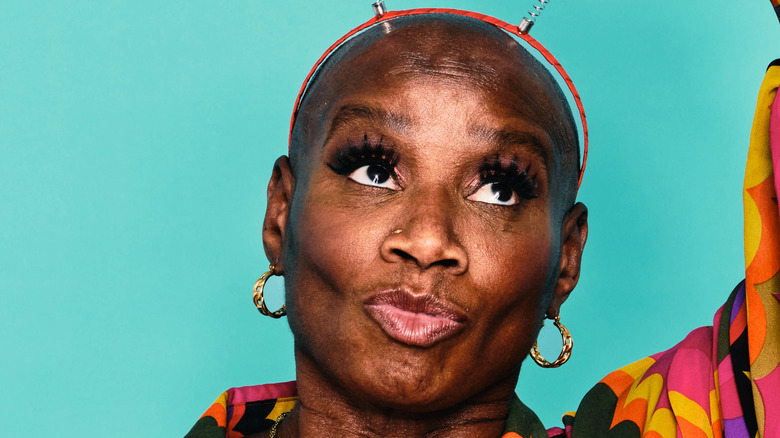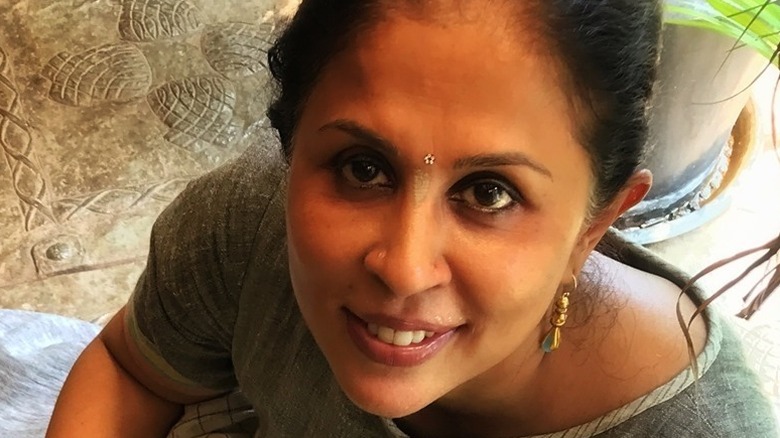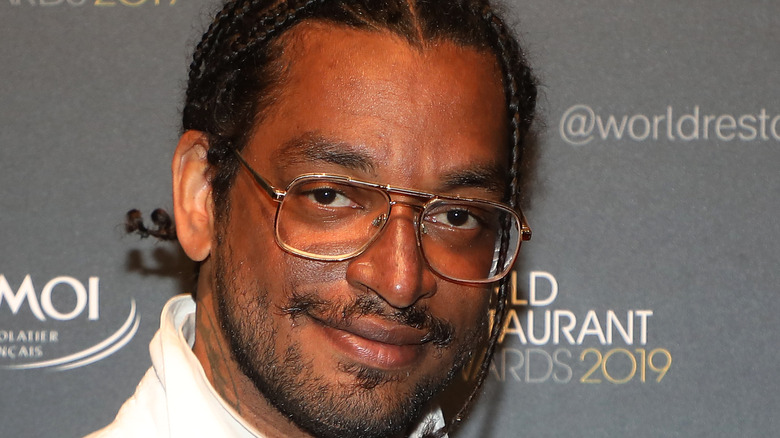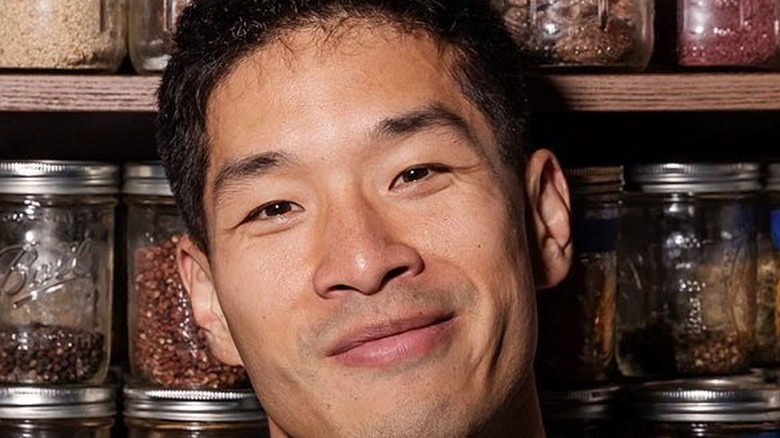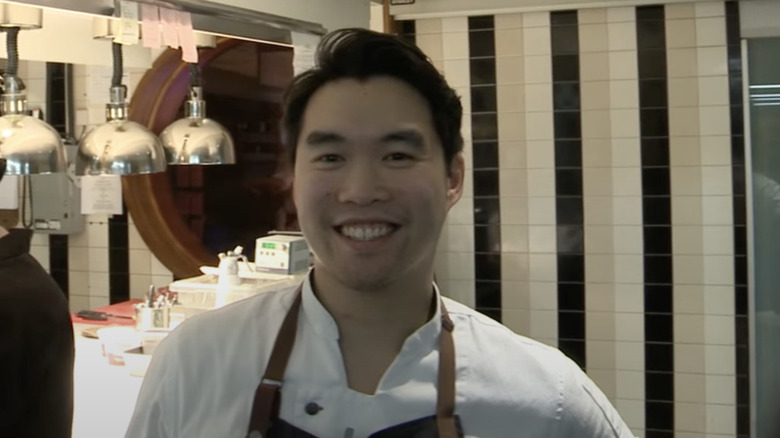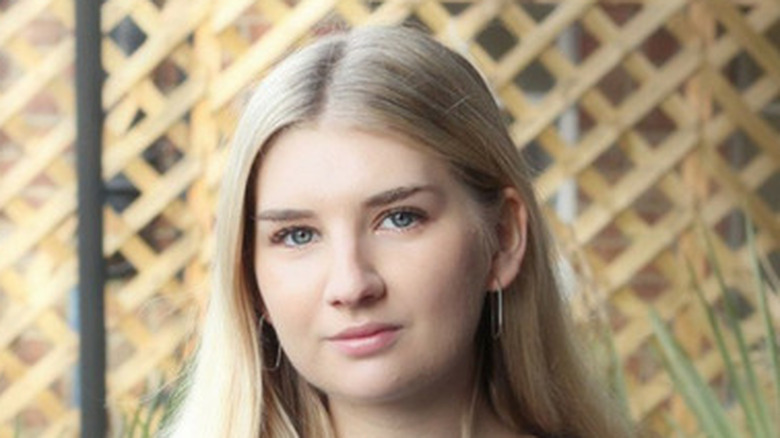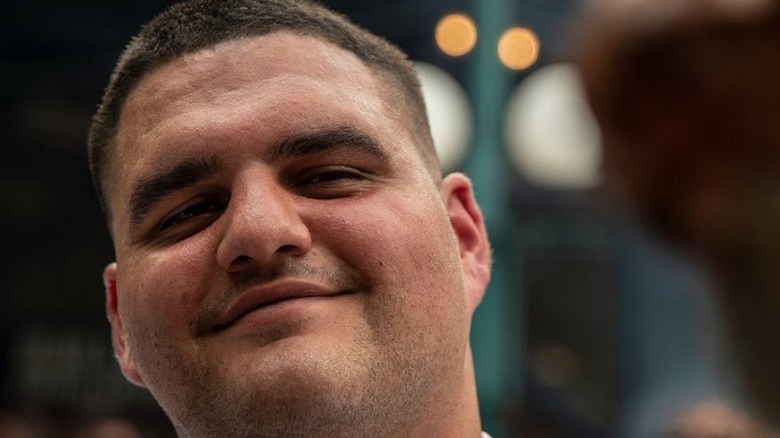10 Chefs And Food Celebs Who Deserve More Attention In 2023
More than just because we want to look like them, we care what stars are eating, which is why big celebrities are getting so well paid for getting into bed with fast-food giants in what The New York Times called "The Era of the Celebrity Happy Meal." It's also why people buy the Hot Ones sauces to try at home with their friends. We want to connect with our idols. Celebrity chefs are nothing new either, but the ways in which we can interact with fame and food have changed in such huge ways over the past couple of decades that the dynamics of what makes a celebrity chef has totally shifted as well. We have seen a massive diversification in terms of the kinds of food content creators we get to enjoy, which is a great thing!
From TV presenters to professional fighters, from TikTokers to experimental scientists, and from all around the world, here are 10 of our favorite under-the-radar chefs and food celebrities who you should be following — if you aren't already.
1. Andi Oliver
If you made Andi Oliver up, nobody would believe you. Oliver emerged onto the UK scene in the '80s with post-punk band Rip Rig+Panic, along with sometime fellow TV chef Neneh Cherry. They were already always cooking, as Oliver told Foodism — "We were quite weird teenagers, I've got to say. We would have these massive parties and we'd go, right, what will we do with the mackerel? It's like, most teenagers don't sit around sousing mackerel. What a bunch of weirdos."
Forty years after the band broke up, Andi Oliver is an established TV presenter — her vibrant personality, iconic fits, and iconoclastic energy provide the spark that stops shows like "Great British Menu" and "The Sky Arts Book Club" from descending into well-meaning mushiness. Her first cookbook, "The Pepperpot Diaries: Stories from my Caribbean Table," will be just as non-conformist — less a list of recipes and more of an invitation to sit at the table and investigate the thoughts, tales, and tastes that took Oliver through lockdown.
Her book and wider work also, inevitably, navigates her Antiguan heritage and her visibility as a female Black British success story in industries that take a lot from people of color but rarely give much back. As she told The Independent — "British multiculturalism is the jewel in our crown. We should be celebrating it in every environment. People of colour should not just be washing dishes."
2. Alexander Volkanovski
Alexander 'The Great' Volkanovski, the current UFC featherweight champion, clearly loves a reference to the ancient world. The Woolongong pugilist's family hails from the lands of his namesake, Greece and North Macedonia, and as well as bringing home the bacon by fighting in the 21st-Century Colosseum, he emulates the heroes of old in other ways as well.
The story of Troy, as told in Homer's Iliad and the movie with Brad Pitt, is a tale of two armies tearing apart a city in a decade-long war. The movie, understandably, focuses on the action, but according to the Paris Review, the ancient epic poem contains a lot of feasting and drinking to contrast all the brutality, highlighting the humanity of these literal legends. Achilles himself is specifically mentioned as throwing down what sounds like racks of lamb, goat, and pork chops to be salted, roasted on spits, and served with bread. Homer understood that the best heroes also know how to put on a good BBQ, and after seeing Volkanovski grilling lamb chops with Rugby League player Tariq Sims on "Cooking With Volk," it seems the champ has absorbed this lesson of Greek history as well.
Volkanovski has been showcasing his skills in the kitchen via his personal YouTube channel for years and has previously stated that, though he has no immediate plans to retire, "Cooking with Volk" features heavily in his future career trajectory, post-MMA, according to Sportsmanor.
3. Ievgen Klopotenko
Food and national identity are closely intertwined, weaving together the fruits of your homeland's soil with tastes and techniques that connect your lunch to the experiences of untold generations. Ievgen Klopotenko had been flying the flag for Ukraine, its products, and its cuisine for years before last year's invasion began. He spearheaded a successful campaign last year that led to UNESCO officially adding borsch, the pleasingly purple beetroot soup which Russia also claims as their own, to Ukraine's list of Intangible Cultural Heritage in Need of Urgent Safeguarding .
This isn't a flash-in-the-pan attention grab, either. Since winning Ukrainian MasterChef eight years ago, Klopotenko has been on a mission to revitalize the way Ukrainians eat food. He successfully revamped the nation's school dinners in 2018, throwing out regulations that had subjected kids to Soviet-era blandness since 1956 . He's attacking the question of Ukraine's taste from both ends, improving the next generation's palate while delighting Kyiv's chattering classes with fresh takes on forgotten Ukrainian dishes at 100 Rokiv — a name which translates to "100 years ago, in the future." He told CBS News that this passionate representation of Ukrainian food identity is his own way to defend his country, as well as making sure that the frontlines have something to fight for — "We are strong, we have our music, we have our religion, and we have our food. And that means that we are Ukrainian."
4. Marina Balakrishnan
When technical innovations in plant-based burgers make headlines, it's easy to forget there are parts of the world where people have been cooking meat-free meals to the highest standards for millennia. Marina Balakrishnan is flying the flag for her hometown of Thalassery and the abundant variety of Kerala cuisine.
Balakrishnan grew up on India's Malabar coast, a hot, wet strip that has been a hub for the spice trade for centuries and is a culinary melting pot thanks to the constant flow of traders and foodies coming in and out. She formally trained in plant-based cooking at New York's Natural Gourmet Institute, and has developed a huge following in Mumbai through her cloud kitchen Oottupura.
The name Oottupura refers to the dining room of a temple, and Balakrishnan's food embodies this sense of embodied nourishment and humble, everyday abundance. Oottupura delivers sadhya, platters of up to 28 different vegetarian dishes, made with seasonal ingredients by a chef with a deep connection to the food she makes. Several Bollywood stars have posted glowing reviews of their delivery feasts and the beautiful plastic-free packaging (which is one clear sign that you are making it in Mumbai!). For Balakrishnan, it's all about serving her customers — "I always say that it is not about me; it is about my customers, the people who trust my food. I want to give them the food that nourished me in my childhood because that's how Oottupura was born."
5. David Zilber
The food world was rocked earlier this year by the surprise announcement that Noma, the multiple time best restaurant in the world that was the incubator of so many trends in fine dining over the past decade, will close its doors in 2024. One of the hallmarks of Noma and its new Nordic style has been the amazing flavors that they are able to extract from local ingredients using unusual, long-term techniques like fermentation. David Zilber was Director of the Noma Fermentation Lab from 2016-2020 and during that time became a bestselling author thanks to the success of "The Noma Guide to Fermentation."
The Toronto native returned to the Great White North to make his debut as a Top Chef Canada judge last year and will be returning to screens in 2023 as a guest judge on Top Chef's All-Stars season 20. He hasn't hung up his lab coat quite yet, though. Since leaving Noma, Zilber has been working with Danish bioscience giant Chr. Hansen. They are a huge supplier of "good bacteria" to the food industry, and Zilber's new fermentation lab has the potential to touch millions more lives than any restaurant dish, however amazing, could. He told Highsnobiety — "When I quit Noma, I wrote this kind of open letter to the Earth saying that I wanted to put myself inside the cogs of the global food system and use fermentation to construct a different reality. This job corresponds to that mission statement."
6. Jon Kung
"Ulysses" by James Joyce dropped just over 100 years ago. Considered to be one of the great works of 20th-century writing, the whole story happens in one day in one city — Dublin, Ireland. When asked why, Joyce famously said that "[i]n the particular is contained the universal." Rather than trying to tell a generic story that many people could connect to in a shallow way, he told quite weird, specific stories that could only happen in that town on that day. However, because that's how most of us live our lives — weirdly, specifically, in towns, on days — people connected with it on a deeper level. Chef Jon Kung has used the same effect to rack up millions of followers on TikTok, showcasing their culinary skills, and flying the flag for third-culture cuisine.
Pre-pandemic, Kung was hustling towards opening their first restaurant by organizing private dinners and pop-ups around Detroit. Once lockdown restrictions started playing havoc with the industry, they started posting recipe videos to TikTok, racking up the views with cross-cultural spins on viral hits and dishes inspired by anime and comic books.
Kung, whose heritage is Chinese and who grew up in Hong Kong and Toronto told Eater — "A lot of my third-culture cooking videos have really resonated with younger kids, many from multiracial or multiethnic families." Kung daily demonstrates that by embracing the particulars of our identity, we can connect with people whose experiences are hugely different from our own — food's truest superpower.
7. Trụ Lang
A huge challenge in fine dining is choosing between tradition and experimentation. In Vietnam, traditional dishes are beloved, but the fine dining scene is more associated with foreign restaurants, there's pressure on chefs to differentiate themselves by showing off how modern and experimental they can be. Headlines and eyeballs drive reservations, which leads to places selling $100 banh mi, and chefs trying to make New Nordic make sense in the tropics.
One way out of this trap is to get ahead of the innovation game, and Chef Trụ Lang is doing so by dialing into seasonality and sustainability at his destination restaurant in Hội An, MÙA. The name translates to "seasons", and it is located on a small estuarine island where locals have grown fragrant herbs for at least 200 years. The focus is on exploring the unique flavors produced by Vietnam's climate and varied ecosystems. From that base, Chef Trụ leverages his experience cooking at iconic and Michelin-starred restaurants in the U.S. to push the boundaries of Vietnamese cuisine.
He's also co-founder of Vietnam's first craft sake brewery, also named MÙA, this time located in bustling Hồ Chí Minh City. This venture combines his environmental activism with high-end Viet-izakaya cooking, and quality sake made with Vietnamese rice, with tropical flavors like passion fruit, mulberry, and guava . The result is something that feels novel, grounded, totally Asian, and thoroughly modern. Trụly one to watch.
8. Lucy Vincent
Lucy Vincent might not be a chef, but she is part of one of the most important and under-discussed subsections of our modern food system — the campaigners who fight to make sure that the benefits of better food and cooking help those who need it the most, rather than those who can afford it. While global relief organizations rightly raise funds to bring short-term food aid to disaster-affected areas that desperately need it, Vincent's cause gets a lot less sympathy, but has effects that are no less life-changing.
Her organization, Food Behind Bars, works with prisoners and prisons across England and Wales to improve the food that's being served to inmates, and the ability of the inmates to feed themselves in the outside world. Vincent founded the charity in 2016 to raise awareness that improving prison food isn't just the right thing to do, morally, but could have a positive impact on the supposed purpose of these institutions — namely reforming and rehabilitating offenders so that they can be a benefit to society upon release.
Alongside cooking contests and vocational training that helps prisoners gain the skills to work in food after release, the core of her work is the fight to feed prisoners better. As Vincent told Vogue, "If more fruit and vegetables, fewer additives, and more appetizing food can transform school classrooms, why can't it have the same affect on our prisons?"
9. Sama Jaad
The Arabic-language version of "Top Chef" spans 22 countries in the Middle East and North Africa. The show is a force for culinary diversity, gender equality, and showcasing the highest standards of hospitality in a part of the world where generosity towards your guests is a sacred ideal. An important part of that process is the winner of season 4, Sama Jaad. Jaad is the first Saudi chef to win the series, and, as well as deftly demonstrating the delightful food of her homeland, her success has helped shift the region's cultural perception of gender. As showrunner Rabih Rammal told Variety, "Before she won, just like in the rest of the Middle East, it was a little bit weird to be a female chef, but ... her victory has helped a lot with the culture in making people understand that a chef is a chef."
Jaad had been cooking professionally for a few years before entering "Top Chef." Per About Her, the wife and mother of two paid tribute to the support and inspiration she received from her family — saying that she saw "Top Chef" as a chance to show her kids that their mother is strong. Since winning, Jaad has opened her own restaurant in Jeddah, Tomillo by Sama, as well as her own lifestyle brand. She told Hospitality News — "I see my success as confirmation that Saudi women are capable of competing against the best, whatever field they're in, and taking top spot on merit."
10. Big Has
Hasan Semay, aka Big Has, rose through the ranks of London's restaurant industry only to walk away in 2019. "By the time I got to head chef, that point where every loose screw in this big machine is your problem, and all you do is stand at the pass ..." he told The Guardian with a sigh. "I'd just wait for my days off so I could cook my own food." Cooking his own food on the weekend became the basis for his YouTube show, Sunday Sessions, where Big Has sits in his back garden in Edmonton grilling delicious dishes for your culinary inspiration. That show has led to a Sunday Times Bestselling book, with another on the way , and Semay feeding fans in real life, with pop-ups at Meatopia and the Sessions food hall in Islington as well as collaborating with rapper Tinie Tempah on his rooftop fried chicken pop-up, RAP.
His food career began when he joined Jamie Oliver's Fifteen training program, and all these years later, the influence of The Naked Chef on Big Has's style is still evident. Just like his mentor, Semay favors the bold, bright flavors, that come from simple, unpretentious cooking with the best possible ingredients. They also share their ability to communicate love and appreciation for cooking, and the desire to inspire audiences to cook at home. If he can do it outside in the North London winter, you can probably manage it in your kitchen, right?

